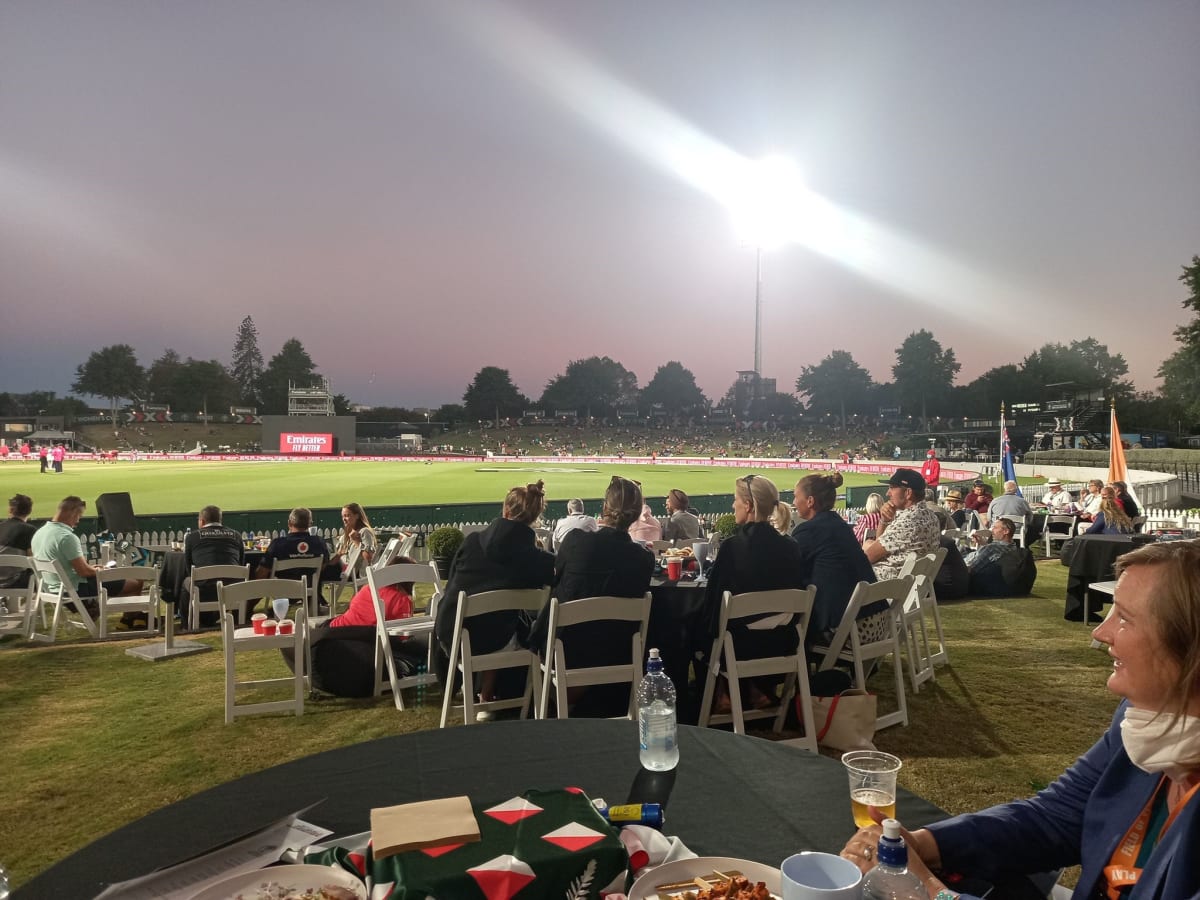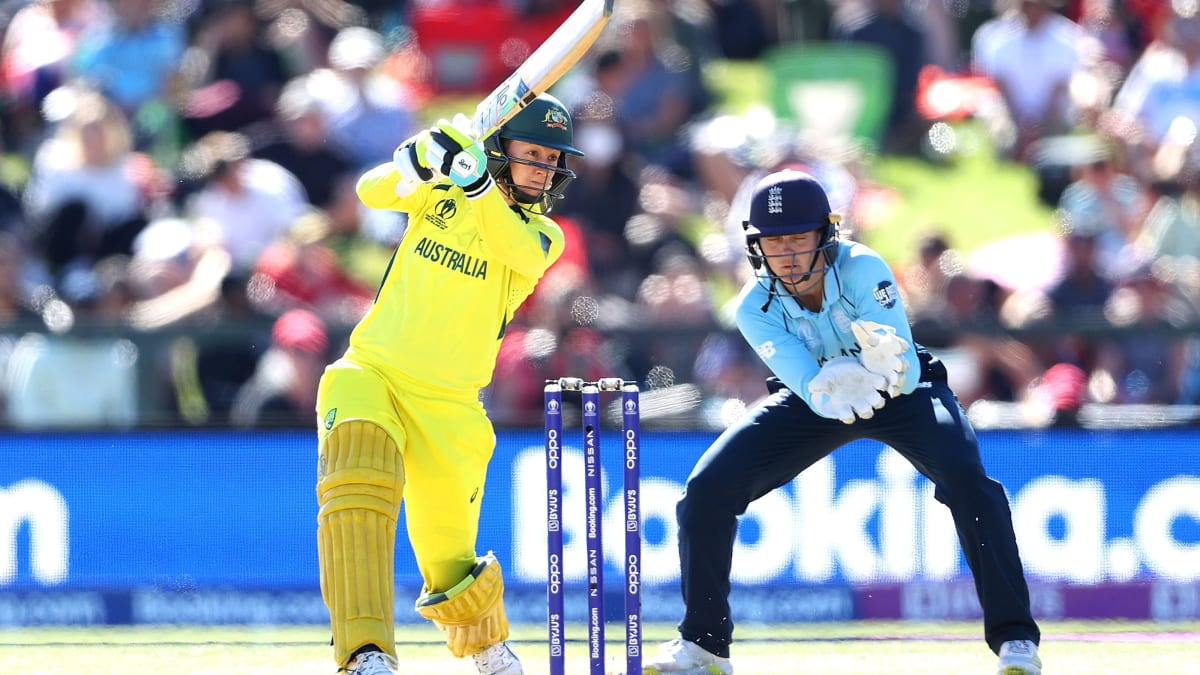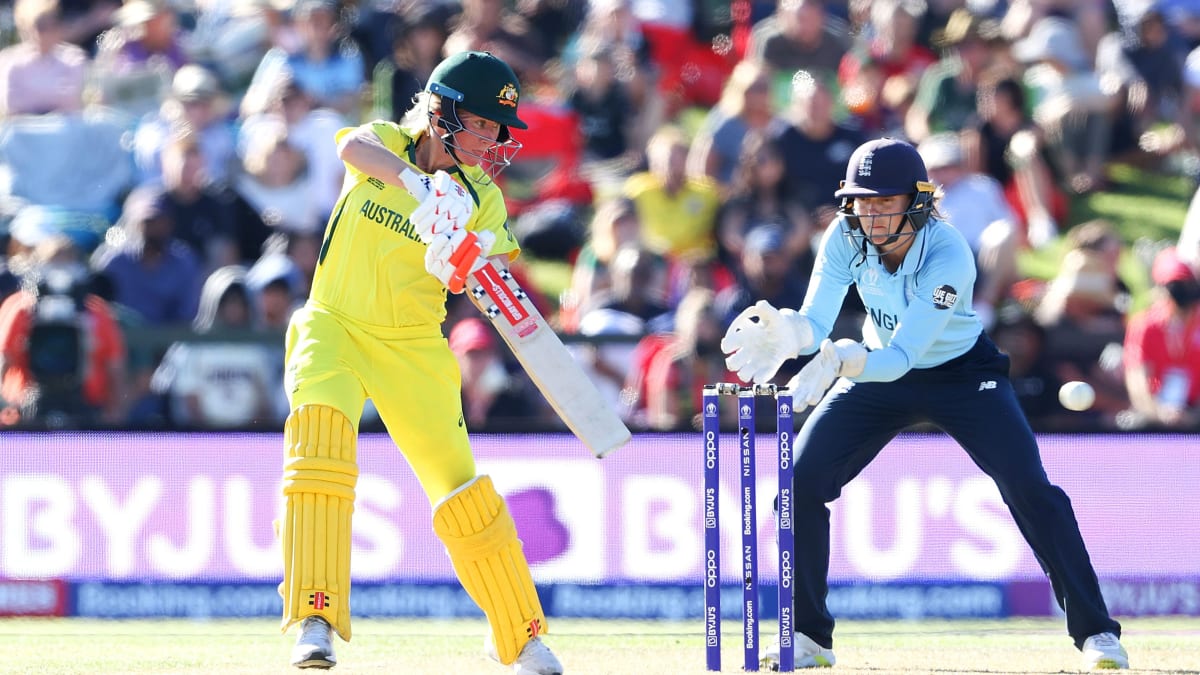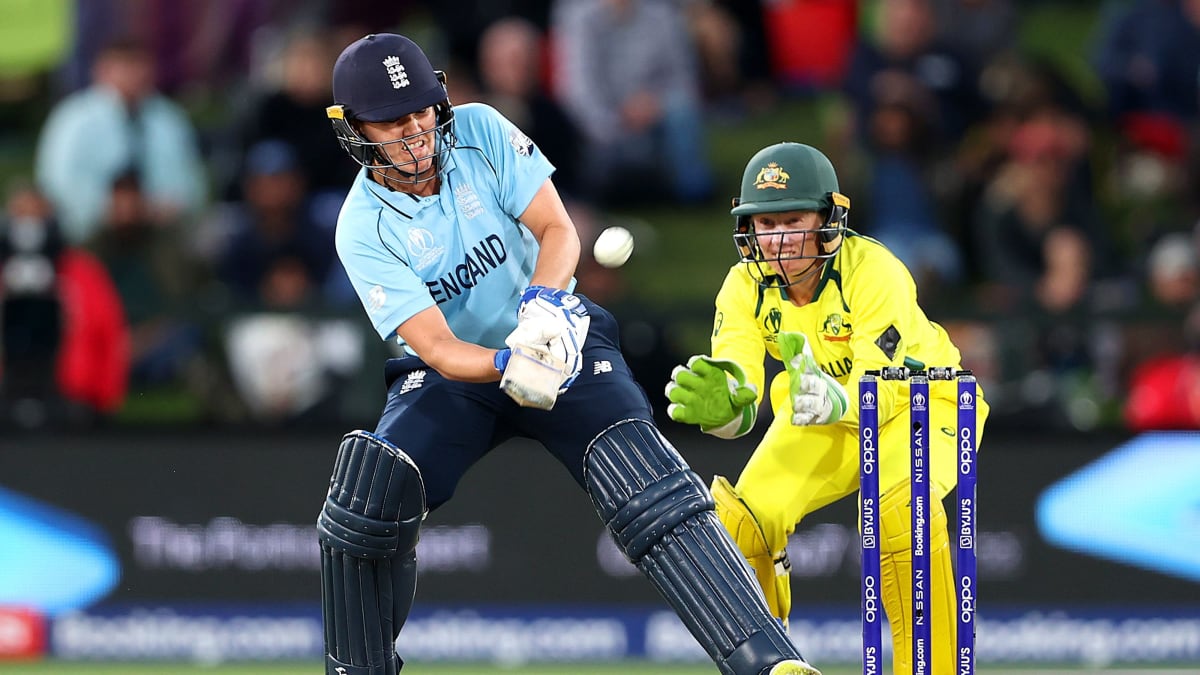
As the record-smashing Alyssa Healy and her Australian side give an absolute masterclass in cricket to claim back the World Cup, the Kiwi heading the tournament talks to Suzanne McFadden about delivering success in a global pandemic and the legacy it leaves.
As Andrea Nelson walked around Hagley Oval on a brilliant Sunday afternoon, her mind flashed back to a moment almost a month ago. A moment that to her said the Cricket World Cup had well and truly arrived.
She was at another ground, this time Seddon Park in Hamilton, where the White Ferns were up against India in their third game of the World Cup.
It was the first time there was a decent crowd, a full house as far as the 10 percent of capacity allowed under the grip of Covid.
“They were there, they were vocal and they played their part in the outcome of the game. You could see the players reacting to it. They brought New Zealand into the game and held them there,” recalls Nelson, CEO of the tournament team who brought this World Cup to life in the most trying circumstances.
“And I thought, this really feels like a World Cup now. People are excited about it, people are talking about it, people care. We have a World Cup on our hands. It gave me a real sense of happiness and pride.”

She felt that same swell of pride yesterday as a crowd of around 6000 poured into the Christchurch oval for the grand finale of the tournament. Granted, it didn’t hold a candle to the 86,000 who packed the Melbourne Cricket Ground for the final of the T20 World Cup in 2020, but this was on a more intimate ground, with no home side in the match, in the country’s current Omicron hotspot.
“I feel an immense sense of pride in what we’ve been able to achieve,” Nelson says, beaming.
The CWC22 final, first over: Australia are sent in to bat after England won the toss. The clouds over Hagley Oval have burned off, and the pitch looks green and fresh, a perfect batting wicket.
After 10 overs: Australia’s classy openers Alyssa Healy and Rachael Haynes have steadily built a solid platform to score from, waiting for errant balls then steering them through the gaps perfectly, to be 37 without loss.
This ICC Women’s Cricket World Cup has been a triumph, but in an unexpected way.
When New Zealand was first awarded the hosting rights, success would have meant sell-out crowds at every match. But that was before a global pandemic changed almost everything, including the start of the tournament, delayed for a year.
“We’ve had to recalibrate a few times along the way,” Nelson says. “What’s really kept our team focused was our vision: to own the moment on the global trajectory of women’s sport and lead the change.
“This tournament has become a real talking point around kitchen tables, here and around the world. The results have been thrilling. The venues have been fantastic. And it’s been a great experience for the athletes.
“With every event, the athletes are the reason you do it. You want to give them the best possible stage to showcase their skills. And I believe we did."
Australia, 14th over: Haynes surpasses the record held by White Fern legend, Debbie Hockley, for the most runs scored at a World Cup (456 set by Hockley in 1997). The out-and-out tournament favourites looking strong and comfortable at 68-0.

Australia, 30th over: After two dropped catches off one Kate Cross over, England finally make a breakthrough – Sophie Ecclestone, the best bowler of this World Cup, tempts Haynes who slices the ball high with Tammy Beaumont safely underneath. A 160-run opening stand comes to an end.
The pitches and outfields at all six grounds used throughout the country during the tournament were of a world-class standard – especially the Hagley Oval pitch for the semifinal and final.
“It doesn’t happen by accident that they’ve been playing on these amazing surfaces, and it hasn’t happened at some previous events,” she said.
“NZ Cricket have been fundamental to the success of this World Cup; they absolutely prioritised this event. And the ICC, too, for standing behind a women’s event of this scale. It’s been a real team effort to get this outcome.”
The improvement of playing conditions for women has underpinned a lot of the progress in the women’s game over the past few years.
Pay equity still has some way to go, though. Australia will take home US$1.32m (NZ$1.9m) from this tournament - which is double the purse England took home as victors in 2017; but still lagging behind the US$4m (NZ$5.8m) the English men received for winning the 2019 World Cup.
Australia, 35th over: Healy scores back-to-back centuries at this World Cup, her 100 off 100 balls in spectacular style. She showed no signs of wearying afterwards, continuing to play masterful shots off increasingly frustrated English bowlers, now well supported by Beth Mooney. 196/1.

Australia, 44th over: Having overtaken Haynes as the top scorer at this tournament, Healy passes 150 (with three consecutive boundaries), while Mooney reaches 50. Defending champions England look at their wits’ end, and there are still six overs to go. 296/1.
This 11th World Cup has gone a long way to revitalise 50-over cricket. Of the 31 games played, 10 you'd class as thrillers.
“It’s been a surprise package for a lot of people,” Nelson says. “It’s easy to forget about one-day cricket sometimes – between the tests and the T20s. But this World Cup has shown why it’s the pinnacle of the women’s game.
“I’ve become a total fangirl, and the Pakistani women’s team absolutely stole my heart during this tournament. They comported themselves so well.”
With crowd restrictions right up until the last week of the month-long tournament, New Zealanders turned to television. Up until the final, Kiwis consumed more than 6.9 million viewer hours through Sky and Prime.
And that was even after the White Ferns departed the tournament much sooner than they'd planned, after losing three of those thrillers. That didn't seem to discourage viewers, because the standard of cricket was so good they stayed through the knock-out stages.
On the weekend Eden Park hosted two World Cup matches (including the White Ferns loss to England that was the nail in their coffin), Nelson remembers taking her youngest son to his Saturday morning cricket match in Auckland. She stood behind a group of dads who were engrossed in a “heated discussion” about the bowling of South African spearhead Shabnim Ismail.
“Why was she so scary to be facing? Was it because she was slamming the ball into the pitch or was it her pace?” Nelson recalls. “And I was standing there thinking ‘Well this is success’. A debate about a topic they previously wouldn’t have thought about.”
Australia 46th over: A standing ovation for Healy, as she's finally dismissed, stumped, on 170; the highest individual score, woman or man, in a World Cup final, the only player, woman or man, to score back-to-back centuries in a World Cup semi and final.

Australia 50th over: After losing a flurry of wickets, Australia still end up with a phenomenal 356-5, leaving England with a stiff run chase.
Nelson has faced challenges in big sporting events in her career, having worked on the 2012 London Olympics, the 2015 FIFA U20 World Cup and the 2017 Rugby League World Cup.
Despite the unprecedent problems this tournament dealt with – border restrictions and MIQ, Covid outbreaks and lockdowns, crowd restrictions among them – she never doubted this tournament would happen.
“We’ve had to deal with a fair bit of adversity, but what it’s done is bring us closer together as a team. The commitment and belief never waivered,” she says. “Pressure creates diamonds.
“This tournament had more existential threat moments than any event I’ve ever worked on. The threat of ‘Can this event happen in this environment?’ was more real than anything you’d get at a major event. But I never believed it wouldn’t happen. And I know our stakeholders never waivered either.”
England, 7th over: England go out with a purpose, but Megan Schutt has two quick wickets. Umpire Kim Cotton, the only Kiwi on the field, gives Tammy Beaumont out LBW when she was looking dangerous on 27. 38/2.

England, 30th over: As Natalie Sciver takes up the challenge to push England’s run rate along, reaching a half century with exquisite shots, Australian leg spinner Alana King is instrumental in the downfall of four more English batters, including a catch, and a stumping with Healy. 193/6
The Cricket World Cup was the first in four major global events in women’s sport to take place in New Zealand over two years. Nelson admits she felt a genuine responsibility to set the bar high for “The Big Four”, with the four Kiwi women heading these events sharing advice and information.
“We felt we had to get it right for New Zealand as host of these three World Cups. I feel like we did a good job of that, and that people will be excited for the Rugby World Cup when it comes around in October,” she says.
“The relationship between the four of us has been great; a genuine help to all of us. Our collaboration in itself will be a big legacy.”
Women in Sport Aotearoa (WISPA), who’ll deliver the IWG World Conference on Women in Sport in Auckland in November, ran a series of workshops during the World Cup called Bats for Six, where 65 young female leaders around the country spent time with 40 wāhine toa working in sports and recreation, then going to a CWC22 match. The programme was co-designed by WISPA co-founder Dr Sarah Leberman and former Black Fern Dr Farah Palmer.
“The ICC were blown away with how people were grabbing the opportunity with both hands, even under challenging circumstances the tournament was held in. No one let that hold them back,” Nelson says.

England, 44th over: in spite of a sublime performance by Sciver, unbeaten on 148, and a competitive run rate, no one stayed at the wicket with her long enough, and England were all out for 285. Player of the match and of the tournament Alyssa Healey calling it a "special game of cricket".
Which brings us back to the legacy this tournament leaves in New Zealand, and women’s cricket.
The first is the physical legacy, which “can’t be understated,” Nelson says.
“The fact our grounds are now female-friendly remains one of the major achievements of this tournament. The gender-neutral changing facilities, new lights at Hagley Oval, those things are really concrete,” she says.
“But bigger than that to me is the increased profile of women’s sport and the perception of female athletes. That will be the biggest legacy this tournament leaves.”







